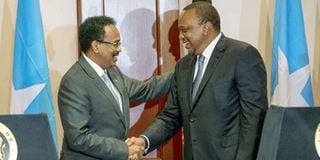Resolve Somalia border row amicably

President Uhuru Kenyatta (right) and his Somalia counterpart Mohamed Farmaajo after their a joint press conference in Nairobi on November 14, 2019.
Negotiations over the disputed area of the Indian Ocean that is the cause of a court case between Kenya and Somalia were unable to bring out an agreement, causing concern among hundreds of thousands of people who depend on the region’s fishing ground for survival.
Mogadishu filed the case at the International Court of Justice (ICJ) in The Hague in 2014. Somalia made its final submissions on Thursday last week at a session that Kenya skipped, having withdrawn from the case earlier in the month.
The disputed area stretches more than 160,580 square kilometres (62,000 square miles) into the Indian Ocean. Somalia wants to extend its maritime border in a southerly direction, along the line of the land border, while Kenya prefers a latitudinal boundary, which would give it more territory.
Fishermen off the Kenyan coast are worried about their source of livelihood. A border running in the direction desired by Somalia would mean the loss of much of the fishing waters off Lamu and the North Coast in general.
With the problem unresolved, the state of affairs will eventually rob them of their fishing zones, not to mention the danger of political tensions. Besides, subsistence fishers are also experiencing hardships and the future seems bleak for them.
The fisheries resources contribute to the economy through foreign exchange earnings, employment creation, food security support and rural development.
It’s time a mechanism that can be effective is put in place to resolve the matter once and for all.
Verine Ogutu, Kisumu
* * *
While the intricacies of diplomacy and international law may not be in the ordinary Kenyan’s grasp, it may be safe to opine that the premature withdrawal by Nairobi from the maritime border case with Somalia was not well-thought out.
Reports that Kenya asked for a delay three times, cited the coronavirus pandemic and an unfair judge seem mere excuses to cover up for our unimpressive Foreign Office. Kenya should have attended the ICJ sessions and launched the most vigorous of legal fights and then wait for Somalia at the United Nations Security Council.
The withdrawal may appear tactical, but the repercussions could prove problematic later.
Kenneth Kuboka, Kakamega
* * *
The disputed area in the Indian Ocean that’s the cause of a stand-off between Kenya and Somalia regarding the common maritime border is rich in oil, and well known for fishing.
A wave of border disputes might arise from more African countries, influenced by this row. The African Union ought to create measures for resolving such issues in the continent amicably.
Teddy Kimathi, Nairobi




